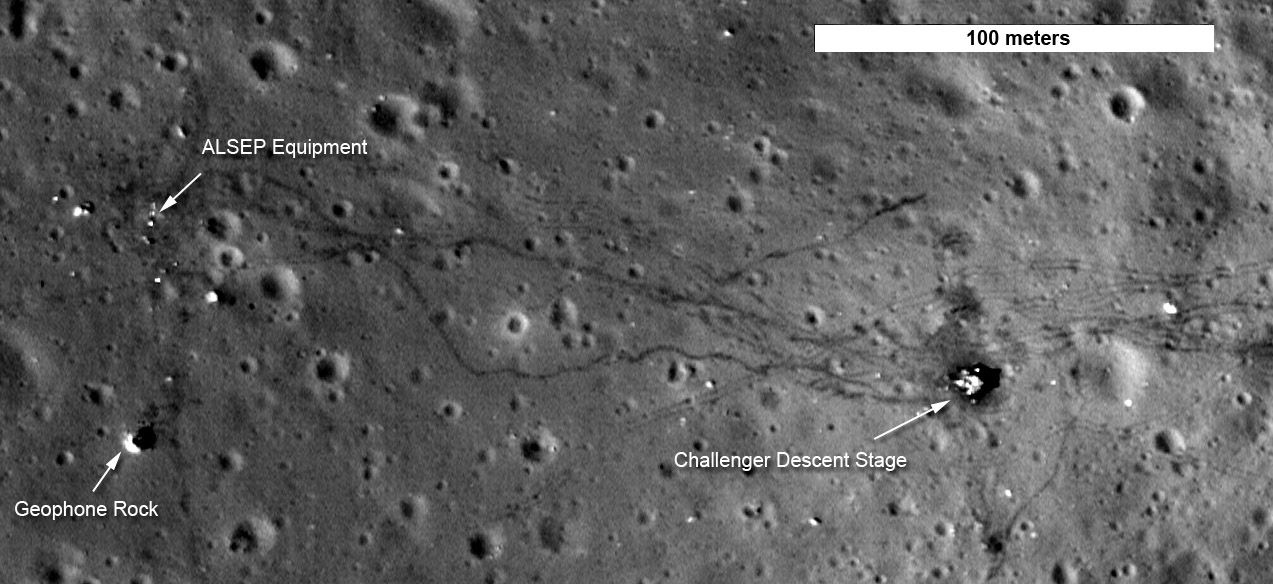Difference between revisions of "April 26, 2021"
| Line 7: | Line 7: | ||
<em>LRO image from [http://www.nasa.gov/mission_pages/LRO/news/apollo-sites.html NASA Press Release]</em><br /> | <em>LRO image from [http://www.nasa.gov/mission_pages/LRO/news/apollo-sites.html NASA Press Release]</em><br /> | ||
<br /> | <br /> | ||
| − | They didn't | + | They didn't send a longer focus lens up to the Lunar Reconnaissance Orbiter but they did lower its orbit. By temporarily increasing the |
eccentricity of LRO's orbit the space craft was brought down within 22 km of the lunar surface during most of August, returning to its | eccentricity of LRO's orbit the space craft was brought down within 22 km of the lunar surface during most of August, returning to its | ||
nominal near-circular 50 km orbit two days ago. Incidentally, the Lunar Prospector flew within 15 km of the surface back in 1999 to | nominal near-circular 50 km orbit two days ago. Incidentally, the Lunar Prospector flew within 15 km of the surface back in 1999 to | ||
| − | improve | + | improve its geophysical measurements. The main reason for the lowering of LRO's orbit was to capture a nearside WAC mosaic with an |
average resolution of 50 m/pixel, compared to the previous 75 m/pixel coverage. The orbit-lowering was also designed to nearly double | average resolution of 50 m/pixel, compared to the previous 75 m/pixel coverage. The orbit-lowering was also designed to nearly double | ||
| − | the NAC resolution | + | the NAC resolution for the Apollo landing sites, and the first three hyper-closeup images (Ap 12, 14 and 17)were released yesterday. This new view of the Apollo 17 site is so closeup that the dramatic scenery of the surrounding mountains is not included, but there is better resolution of the tracks made by the astronauts and their rover. This permits a more accurate tracking of exactly where they went on EVAs so that the locations of samples can be pinpointed and their geologic setting better understood. Considering that the tracks of rover wheels are visible in some of these new landing site views, these images would also reveal astronauts in their bulky spacesuits if any happened to be on the surface. Alas, LRO is 40 years too late (even with the fantasy of [http://apollo18movie.net/ Apollo 18]). |
<br /> | <br /> | ||
<em>[mailto:tychocrater@yahoo.com Chuck Wood]</em><br /> | <em>[mailto:tychocrater@yahoo.com Chuck Wood]</em><br /> | ||
Latest revision as of 05:54, 28 April 2021
Back On the Moon Again
Originally published September 7, 2011

LRO image from NASA Press Release
They didn't send a longer focus lens up to the Lunar Reconnaissance Orbiter but they did lower its orbit. By temporarily increasing the
eccentricity of LRO's orbit the space craft was brought down within 22 km of the lunar surface during most of August, returning to its
nominal near-circular 50 km orbit two days ago. Incidentally, the Lunar Prospector flew within 15 km of the surface back in 1999 to
improve its geophysical measurements. The main reason for the lowering of LRO's orbit was to capture a nearside WAC mosaic with an
average resolution of 50 m/pixel, compared to the previous 75 m/pixel coverage. The orbit-lowering was also designed to nearly double
the NAC resolution for the Apollo landing sites, and the first three hyper-closeup images (Ap 12, 14 and 17)were released yesterday. This new view of the Apollo 17 site is so closeup that the dramatic scenery of the surrounding mountains is not included, but there is better resolution of the tracks made by the astronauts and their rover. This permits a more accurate tracking of exactly where they went on EVAs so that the locations of samples can be pinpointed and their geologic setting better understood. Considering that the tracks of rover wheels are visible in some of these new landing site views, these images would also reveal astronauts in their bulky spacesuits if any happened to be on the surface. Alas, LRO is 40 years too late (even with the fantasy of Apollo 18).
Chuck Wood
Related Links
Rükl plate 25
Yesterday's LPOD: Posidonius And Daniell
Tomorrow's LPOD: Fly Me To the Moon
COMMENTS?
Register, Log in, and join in the comments.



